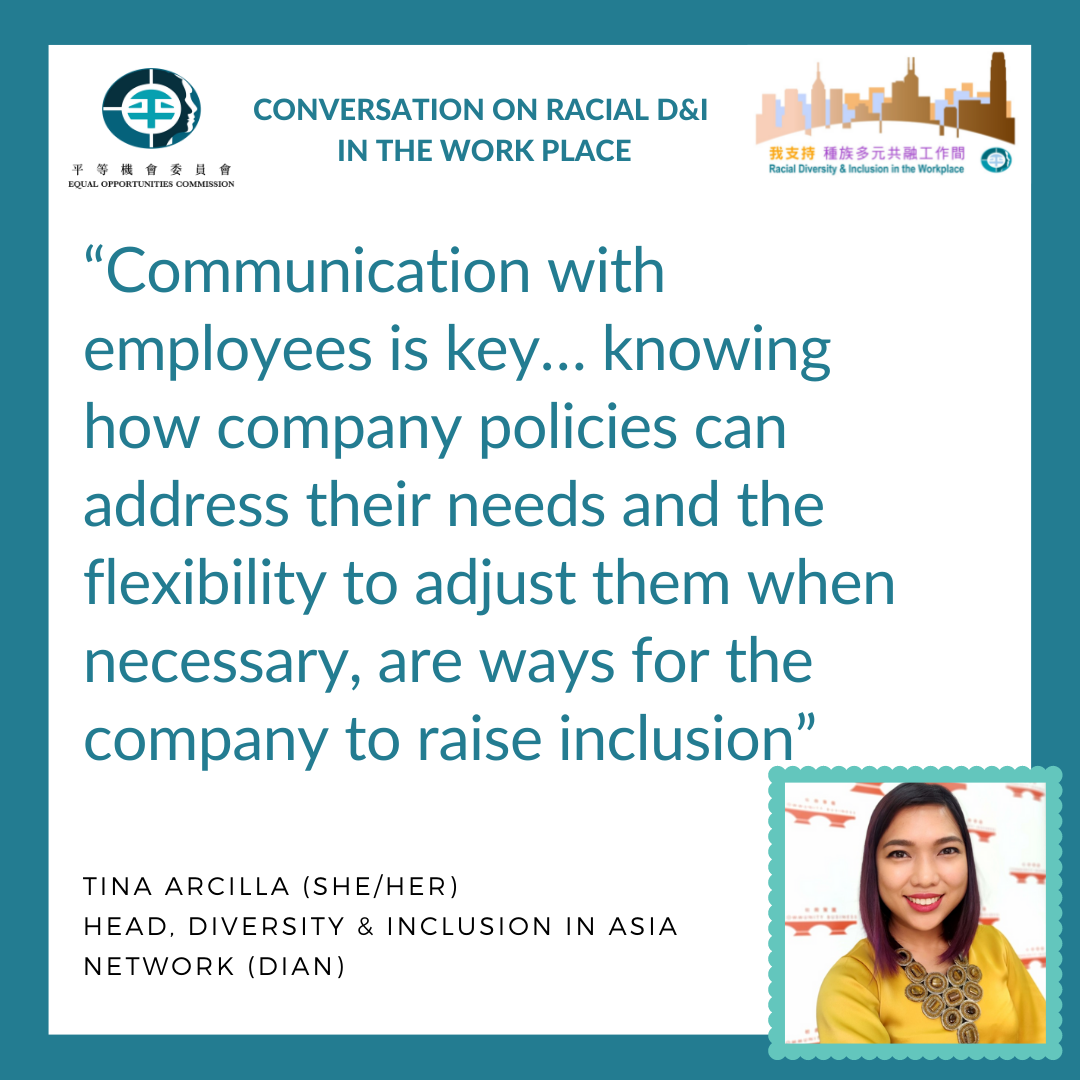種族多元共融對話: Tina Arcilla (社商賢匯代表)(2021年4月17日)(只備英文版)
與Tina Arcilla對話 (she/her)
社商賢匯 Diversity & Inclusion in Asia Network (DIAN) 主管
工作間的種族多元共融

Community business is a registered non-profit charity headquartered in Hong Kong. Its mission is to lead, inspire and support businesses to have a positive impact on people and communities.
DIAN- Diversity and Inclusion in Asian Network is the leading network of companies that are committed to advancing diversity and inclusion in workplaces across Asia.
The network was established in 2007/8 with a priority to promote female representation at leadership levels. Looking at large multinational companies at that time, it was found only locals could progress up to a certain point. Beyond that, it was largely for talents that were flown in to take higher spots.
DIAN on racial inequality
Racial inequality is not something new. It is incredibly ingrained into value systems and in what society believes in. At DIAN, we believe that when businesses choose to ignore issues around race, religion, culture anything like that, it's ignoring a large part of what makes their workplace and customers stick.
Addressing racial diversity and inclusion can yield positivity into their business benefits. It is broad diversity and inclusion that can be good for a business; not just race.
Diversity differs from inclusion. Hiring X% of ethnic minorities into an organization doesn’t automatically make it an inclusive workplace. That is diversity, but not necessarily inclusion.
To achieve inclusion in the workplace, we need to look at policies and structures that ensure fair treatment. We need to guard against discriminatory practices and behaviours and help everyone feel physically and psychologically safe and included in their workplace.
Psychological safety means that people knowing that their identity as human beings will not be ridiculed. They know that they will be seen as valid and their ideas heard and valued. And they feel safe enough to raise concern or to tell others when a behavior is not OK.
Benefits of racial diversity and inclusion
Customer connection
If you're from the same part of the world, you get that connection with your customers. But if you're not from the same place or don't speak the same language, communicating your understanding of other people's culture is incredibly valuable. That inclusion can be from racial diversity.
So even if you don't share that connection or are from the same place, you can communicate that value and create that bond. As a result, you can create long-lasting brand loyalty with your customer.
Diverse ideas and opportunities
As a company, racial diversity can help you know your existing customer’s pain points, identify new business opportunities or new customers. It is about knowing what you can deliver to meet your diverse customer needs.
Ignoring the racial aspect will mean missing out on so many opportunities. Include diversity within your team because doing market research cannot be enough. You need to have presentation and insight in your team depending on the type of work you do.
Building loyalty
Inclusion within your workforce ensures that people feel protected and safe. This will increase productivity. In a workplace that lacks inclusion, it takes a lot of energy to be accepted, especially when only certain types of people get heard or promoted.
As an employer, look after the welfare of your employees by recognizing, celebrating and valuing their racial differences.
How to create an inclusive workplace
A lot of companies want to be inclusive. However, there is hesitation because of confusion around what needs to be done. It's important to understand the principles, look at the existing problem in the organization, and then find a solution that works. We do not like a list of do and don’t but here are some ideas that you can considered.
1. Encouraging cultural awareness
Creating awareness of the diversity within the organization is important as it allows you to have your potluck lunch, have your book sharing or celebrate each other’s festivals. It opens people's eyes to diversity.
What you need to look at is psychological safety. Do people even with all these programs feel able to speak about how they celebrated their weekend, or do they feel that that's not something appropriate to talk about at work?
2. Avert discrimination
Inclusion is about looking at the things that make people feel included and excluded. Some of them are so subtle e.g. microaggressions. Microaggressions are small daily attack or offences. If you're subjected to it every single day where part of your identity is chipped away and attacked, you feel that it's a place that you don't want to come and work again.
A lot of time, it's not intentional by the person offending. However, they can cause you to question your value as a person because you feel that everyone around you brings you down.
How to measure psychological safety and treat microaggressions
To treat microaggressions, you need to look at both the intent and the impact. If the person acting has positive intent, but what they do hurts another person, we can only agree that the hurt has happened even though the person who committed that action had good intentions.
Generally, people have good intention. They don't go out there intentionally to hurt others. We need to understand that you can be a good person but do a miss. We need to be humble enough to acknowledge that.
In a situation where microaggression is happening, psychological safety is important because somebody experiencing that hurt needs to feel safe enough to say that hurts, it's not good or it makes me uncomfortable.
The responsibility is on that person experiencing hurt to speak up and say, “Hey, I don't think that was the right thing to say or to do”.
Be aware and look at the safety of the people involved. It's a constant thing and you are likely to fail, but you have to do it because you are living in a society where you want people to feel included.
Measuring is a little tricky and involves looking at what you have in place in terms of systems and processes
Do you have a mechanism for reporting things and is there anonymous feedback that you get?
Companies are doing surveys and asking people whether they feel safe or included in the workplace. It's not a perfect system, but that's what we have so far.
Religion is a big part of identity to some ethnic minorities. Can you share some of good practice for companies to address the religious needs of ethnic minorities?
First of all, company should know who their employees are and what is important to them. You can have a conversation with your staff. However, it depends because some organizations are cautious about what they can ask or not. Just knowing additional requirements or understanding your staff is incredibly important.
If looking at holidays and time off structures that you have, for example, here in community business there is celebration leave where you can use that in whatever way you want.
For policy, we need to know that our policy communicates that we don't discriminate. If there's anything the policy does not cover and comes, there should be a mechanism where employees can speak up.
Food options in your cafeteria or events should look at different needs of your staff. It's important to do that not just from a religious inclusion perspective, but also from food allergies and health perspective.
如欲觀看完整訪問片段,請瀏覽https://www.facebook.com/embracecampaignbyeoc/videos/821329862070869


